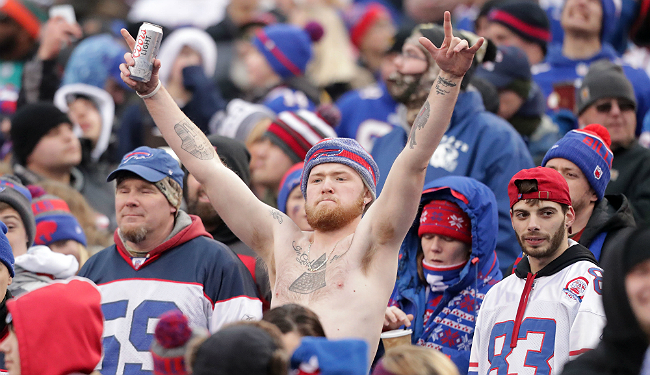
My Buffalo Bills played the New York Jets on New Year’s Day. Both teams missed the playoffs, and ended their miserable seasons with a stammering dud of a game that was extremely appropriate for the occasion. The Jets coasted to a 30-10 win, in large part to the Bills benching quarterback Tyrod Taylor because they didn’t want to run the risk of him getting hurt and getting the money his contract entitled him to. He’ll be cut soon, and will hopefully go on to success elsewhere.
I spent most of the game at brunch with friends, and didn’t pay much attention after the first few minutes. It was great. The Bills are relatively easy to ignore in the offseason, and I’m looking forward to the coming months where days pass between them clouding my thoughts. But this year, more than any before, I’m ready to banish the rest of the NFL to the periphery of my day-to-day life. The only problem is that this isn’t actually very easy when most of your friends still love it.
You may have heard that the NFL is struggling. Whether it actually is or not depends on who you ask, of course. Struggling is a relative term, but after years of the league being talked about like some kind of unstoppable, unassailable monolith, people seem to have discovered it isn’t. This could be for any variety of reasons — some of which we’ve discussed before — but there are a few major ones.
The ongoing trickle of information about head injuries that makes queasy wincing a more and more common reaction to the big hits, rather than excitement. Then there’s the league’s bewildering discipline structure that punishes players more harshly for smoking marijuana to treat Crohn’s disease than for abusing women.

On top of that, no one seems to have any idea what the rules are, and people are tired of the weekly kabuki in which a referee attempts to divine whether it was A Catch or not. The commentators add little value to the game experience. Color analysts, in particular, are rarely anything other than enthusiastic dullards; ex-players who clearly have knowledge of the game, but no ability to translate its complexities for the audience, and just resort to mush-mouthed clichés
And with some obvious exceptions, the games are a bland cocktail of low quality and low entertainment value. The great games are still great, but a large portion of the schedule is junk.
Open Twitter on an NFL Sunday, and it won’t take long to find someone openly wondering why the hell they’re watching it. Yes, Twitter loves to be miserable, but you don’t find anywhere near this level of open loathing with other sports. Suppose for a moment that sports are a distinct and separate world from real life — which is bullsh*t — but any pleasure one might find in escaping reality by watching an NFL game is immediately vaporized by some anonymous NFL personnel ghoul claiming a Trump presidency will be good for them. You can’t even enjoy a message from the official military appreciation sponsor of the NFL without feeling like you’re on the butt end of one big joke.
Over the past two seasons, I’ve gone from watching nearly every NFL game I could watch, to watching almost none. It’s been much easier than I imagined. I still watch most Bills games, so if you’d like to call me a hypocrite, that’s fine. I consider myself more of a masochist than anything for continuing to subject myself to their astonishing run of incompetence, but there’s more than one label you can apply here. I’ve emotionally detached myself from the team though, so at the very least, their wretchedness doesn’t make me upset anymore. Sure, Rex Ryan is gone, but the latest round of front office blame-dodging has been maybe the most embarrassing yet, an astonishing feat considering the franchise’s execrable history. No one really knows what the general manager does, and the team looks like more of a dead end than ever. It’s great. It’s really great.

No, the hardest part of ridding yourself of the NFL isn’t the football, it’s everything around the game. In sections of the country where pro football has always reigned supreme over college for the public’s mindshare, there is so much cultural dress that has simply become a part of every Sunday. The NFL has so woven itself into our social fabric, that to disengage entirely would mean that you would have to remove yourself from the rhythms of friendship. As an early 30-something, many of my friends have kids and busy family lives. The way that we socialized when we were young and single doesn’t really work anymore, and watching the Bills and other games on Sunday have become one of the central points of contact for gatherings.
It’s become noise in the background while real life takes place. Maybe it’s always been that way for well-adjusted people, but as someone who’s spent a large portion of his life being irate about my incompetent teams of choice, this is a strange sensation. It might be easier to quit cold turkey, rather than watch and train yourself to not care that they blew another second half lead to the Dolphins, or some other flavorless team.
We emotionally invested in sports as a distraction from the drudgery of everyday life. But when sports themselves become just as frustrating and unpalatable as your underpaying job or fractured relationships, emotional investment moves from something silly and inconsequential to hazardous for our emotional and psychological well-being. If rooting for an NFL team has become more trouble than it’s worth, unplugging is easier than you might think. But part of being an adult means you don’t have to force every one of your decisions on your friends and family — ideally, anyway. So if you’re over it, but your friends and loved ones still love to get heated on Sundays, remember that it’s possible to disengage from the soulless corporate sports league without missing out on time with your friends.






